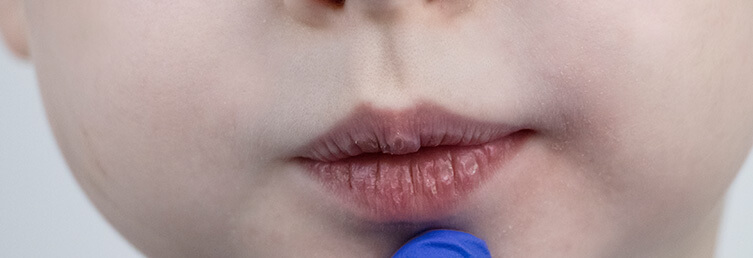Airway Services
Facial Growth & Development
During the first 18 months of life, significant growth and developmental milestones occur that shape our facial features. By the age of six, approximately 60% of a child’s facial development is complete, and by age 12, it reaches 90%.
Proper breathing plays a vital role in children’s health, development, and educational success. Detecting and addressing airway problems early on can greatly optimize their overall physiology, and evaluating the airway is an essential step in this process.

What can influence facial development?
- Functioning of muscles
- Proper nutrition
- Ability to breathe normally
Some of the most common facial development abnormalities seen in children are caused by a compromised airway or the inability to breathe properly through the nose. Children who cannot breathe well through their nose tend to breathe more through their mouth. This sets up a chain of events which may severely impact not only the health of a child but also the way a child’s facial features develop, and ultimately the way a child looks as an adult.

Signs and Symptoms
- Chapped lips
- Venous pooling beneath the eyes (dark circles beneath the eyes)
- Changes in head posture (posturing the head forward and/or tipping the forehead backwards)
- Tongue-thrusting
- Tongue-tie/lip-tie
- Deviated septum
- Tonsil and adenoid problems (Chronic sinus problems, throat problems)
- Snoring (Snoring is not natural for children)
- Loud grinding of teeth during sleep
- Bed wetting
- Reflux in the Eustachian Tube
- Chronic sinus infections
- Frequent ear infections
- Allergies
- Difficulty swallowing
- Clenching/grinding
- Picky eating
What is Orofacial Myofunctional Therapy?
Highly Effective Physical Therapy Exercises to Improve Breathing, Bite, and Orofacial Posture.
Myofunctional therapy is a highly effective form of physical therapy aimed at improving breathing, bite, and orofacial posture. The interaction between orofacial structural growth and muscle activity begins early in development, and proper physiological functions in infancy stimulate subsequent growth. By training facial muscles to function optimally, we can maintain proper alignment of the teeth and jaw as we grow.
Orofacial Myofunctional Disorders (OMDs) affect the functions and muscles of the mouth and face, leading to a variety of issues. Myofunctional therapy can address a wide variety of problems, including:
- Orthodontic relapse or movement after having braces
- Jaw and TMJ pain
- Tongue ties
- Teeth clenching and grinding
- Snoring and Obstructive Sleep Apnea (OSA)
- Improper swallow (tongue thrust)
- Dental malocclusion (severe crowding or improper bite)
- A child that sucks their thumb, fingers, blanket, etc.
- Residual speech impediments, especially after having speech therapy
- Improper mouth habits such as nail biting, open mouth breathing, chewing with mouth open
Our myofunctional therapist provides a customized treatment plan for each patient that includes neuromuscular exercises to retrain the lips, tongue, and facial muscles, as well as helping break noxious habits like thumb sucking and nail biting.
Correcting oral rest posture and function improves nasal breathing, facial appearance, dental occlusion, speech, and swallowing. When oral rest posture is correct, there is harmony and balance between our muscles to enhance speech, swallowing, chewing, facial symmetry, nasal breathing, and aesthetics. For children, it will promote proper craniofacial development.
Patients often see changes in their facial structure as well as posture. Myofunctional therapy is also an important adjunct to orofacial procedures such as frenuloplasties. Our goal is to cultivate an awareness of muscle use and develop a therapy program of regular exercises designed specifically to your needs.
Myofunctional therapy can help children as well as adults, and it can be an
attractive alternative treatment for sleep apnea. For example, you may be able to improve the use of continuous positive airway pressure (CPAP). It is also non-invasive, inexpensive, and has no major risks. In addition, the therapy has been used for other conditions.
Myofunctional therapy may benefit those who suffer from a variety of ailments, including:
- Headaches
- Gastroesophageal reflux disease (GERD) or heartburn
- Temporomandibular joint (TMJ) pain
- Neck pain
- Thumb sucking
- Nail biting

About Our Orofacial Myofunctional Therapist
Ali Walters, RDH, BS, Orofacial Myofunctional Therapist
Ali started working with Dr. Clayton at Columbia Dental Group in 2016, shortly after graduating from The University of Tennessee Health Science Center with Bachelor of Science in dental hygiene. Ali’s motivation to pursue continuing education for orofacial myofunctional disorders (OMDs), came from her own struggles with sleep, health, and dental problems. Dr. Clayton had also started learning about sleep disordered breathing and the effects on dental and systemic health.
After many hours of continuing education, Dr. Clayton and Ali started working with The Breathe Institute to further their research-based education. She has spent hundreds of hours in continuing education to provide the most up-to-date standard of care to her patients and will be working toward certification in Fall 2023.
One of Ali’s favorite things about correcting OMDs is the life-changing effects it can have on her patients. She finds many patients don’t even realize the cascade of health problems directly correlated to OMDs until they are addressed. The dedication behind these highly effective exercises will make all the difference in improvement of symptoms.
If you think you could benefit from Orofacial Myofunctional Therapy, please give us a call to schedule a consultation with Ali. Our consultations include a comprehensive health history review, specific OMD questions, sleep quality screening, scans, functional assessments, photos, and a review of proposed treatment intervention.
